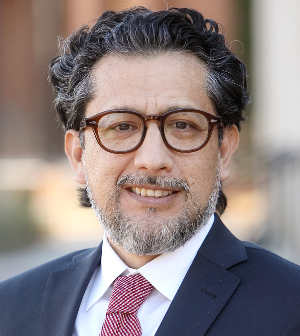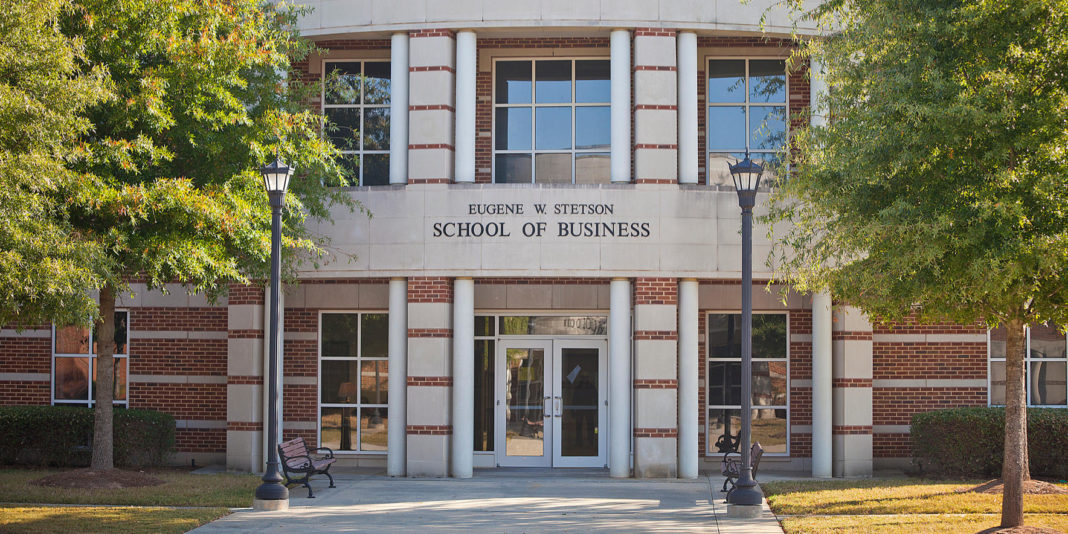As the country continues to grapple with high inflation, many Americans fear a recession. The Den talked to two Mercer University economists about what a recession is, how we got here and what we can do about it.
Dr. Antonio Saravia is an associate professor of economics and director of Mercer’s Center for the Study of Economics and Liberty. With more than 20 years of academic and consulting experience, his research focuses on institutional economics, political economy and the determinants of economic freedom.
Dr. Andres Marroquin is an associate professor of economics and faculty affiliate in the Center for the Study of Economics and Liberty. With over 15 years of experience in economics, his research centers on culture, institutions, entrepreneurship and development.
What is a recession?

A recession is a significant downturn in economic activity reflected in a decline in the growth of gross domestic product, or GDP. GDP is the monetary value of all final goods and services produced in a country.
“The conventional definition has been if you have two consecutive quarters of negative growth in your GDP, then you are very likely in a recession,” Dr. Saravia said.
Some economists debate how many consecutive periods of decreased growth there should be, and others say additional indicators, like unemployment, impact whether a country is in a recession, Dr. Marroquin said.
So, are we in a recession?

Dr. Saravia pointed to the recent GDP report from the Bureau of Economic Analysis, which shows the U.S. economy shrank by 0.9% in the second quarter of 2022, following a 1.6% decrease in the first quarter.
“(We have) two consecutive quarters of negative growth rates, and whenever that has happened, since at least the 1940s, the National Bureau of Economic Research has declared that period a recession,” Dr. Saravia said.
The nonprofit National Bureau of Economic Research officially decides whether the U.S. economy is in a recession, but it hasn’t made that call yet.
“Some people say yes because we see a reduction in the GDP. Other people say we need to be a little bit cautious because there are other indicators that are not as bad or could be worse, like, for example, unemployment,” Dr. Marroquin said. “The problem is that usually unemployment lags — which means that in a recession it takes time for people to start losing their jobs.”
So far, the U.S. has not seen the unemployment rate increase, which is expected in a recession. The U.S. added 528,000 jobs in July, and at 3.5%, the unemployment rate has returned to its pre-pandemic level, according to the Bureau of Labor Statistics.
“If there is a recession, then we are going to see unemployment increase in the next few weeks or the next few months,” Dr. Marroquin said. “So, we see a reduction in the rate of change of GDP, and then we might see an increase in unemployment.”
Dr. Saravia said the labor market is strong because workers are “cheap” right now. This is because nominal wages have not increased with the rate of inflation, he said.
“But at some point, nominal wages are going to push up because the workers are going to say, ‘This doesn’t make sense. I’m taking less money home in real terms. You have to increase my salary.’ And when that happens, then companies are likely to let people go,” Dr. Saravia said.
“So, the labor market is strong for now, but when nominal wages adjust to be on par with inflation, then that’s when we’re going to start seeing unemployment, and that’s very, very typical in a recession.”
Even if we’re not yet in a recession, one is likely coming.
“My guess is that things are not looking good for the next few months because of what is happening with interest rates,” Dr. Marroquin said.
In an effort to curb inflation, the Federal Reserve has been increasing its benchmark interest rate. This helps inflation by taking money out of the economy but at the same time makes it more difficult to get capital for economic development.
And a decrease in the growth of the economy leads to a recession.
How did we get here?
Rewind back to 2020, when the COVID-19 pandemic was just taking hold. Many people lost their jobs or were out of work due to mandatory shutdowns or sickness.
To help ease Americans’ financial stress due to COVID-19, the federal government issued three direct payments, known as stimulus checks, to individuals totaling $931 billion between April 2020 and December 2021. The Fed also lowered interest rates.
This massive influx of cash into the economy directly contributed to inflation, Dr. Saravia and Dr. Marroquin said.
“What we see right now is a consequence of the COVID crisis that we faced but also the reaction of the Federal Reserve to that crisis,” he said. “In economics, any policy is going to have consequences, so what we see right now is a consequence of those policies.”
In June, inflation reached a 40-year high at 9.1%. In July, the inflation rate decreased to 8.5%.
“At the end of the day, the culprit is inflation. We are in a period of very high inflation like we haven’t seen in 40 years, and so the Federal Reserve, the central bank of this country, is trying to stop it,” Dr. Saravia said. “The only way to stop it is to act like a vacuum cleaner and suck out money from the economy because the excessive amount of money is what’s causing prices to go up.
“We have to remember that money supply increased at a very rapid pace since February 2020. By February 2021, money supply was increasing at a 27% year-to-year rate. That was crazy. This variable normally increases at a 3% rate. No wonder we have inflation. The only way to stop it is to reverse the process.”
To stop inflation, the Fed must raise the interest rate, he said, which will make borrowing more expensive and, as a result, lessen economic growth.
So far, the Fed has twice increased the interest rate by 0.75 percentage points, bringing the benchmark rate to a range of 2.25-2.5%.
Dr. Saravia said the Fed’s reaction has been too timid, and it will take more aggressive increases to combat inflation.
“You don’t like to think about a recession, but this is what we need today. We need a recession because it’s better to have a recession today than to have a recession later,” he said. “It’s like a snowball. If we don’t really slam on the brakes to control inflation, then it is just going to get worse and worse and worse. And by the time we decide to face the problem, we’re going to have to increase rates even more drastically and create a much bigger recession.
“So, what you want is a recession today, hopefully mild, that allows you to control the inflationary problem rather than having to wait and create a snowball of inflation that then you cannot stop.”
Dr. Marroquin said the Fed has a complicated job. It wants to control inflation while also avoiding a recession. There are some other actions the government could take to promote economic growth, such as reducing taxes and regulations to try to stimulate the economy.
“I think they are considering these two scenarios. They might try to find a middle ground where they raise the rates but not too much, so there is a possibility of a recession but it’s not as hard,” he said.
How can I prepare my finances for a recession?
During a recession, borrowing money is more expensive, and people may lose their jobs.
Dr. Saravia and Dr. Marroquin advised Americans to start saving and reduce spending now.
“Saving is going to be very important, and try to reduce your spending,” Dr. Marroquin said. “Try to see if you really need that thing that you want to buy, or can it wait? If you don’t really need it, then probably you should wait and save that money because there is a risk of a person losing a job.
“Try to be as prepared as possible for that, and that means having savings that you can use.”
Dr. Saravia advised against buying anything that involves getting a loan, such as a car or house, because of increased interest rates. If you must get a loan, don’t get one with flexible rates.
“You may start with a somewhat low interest rate today, but if it’s a flexible interest rate, that’s going to go up as the Fed increases its benchmark rate — and the Fed is going to increase its benchmark rate further and further if they have to,” he said. “It’s the only way to stop inflation.”
He gave one word to consider when shoring up your finances: prudence.
“Protecting yourself and your finances today, rather than borrowing and spending as politicians often want you to do, is what benefits the economy in the long run,” he said.










